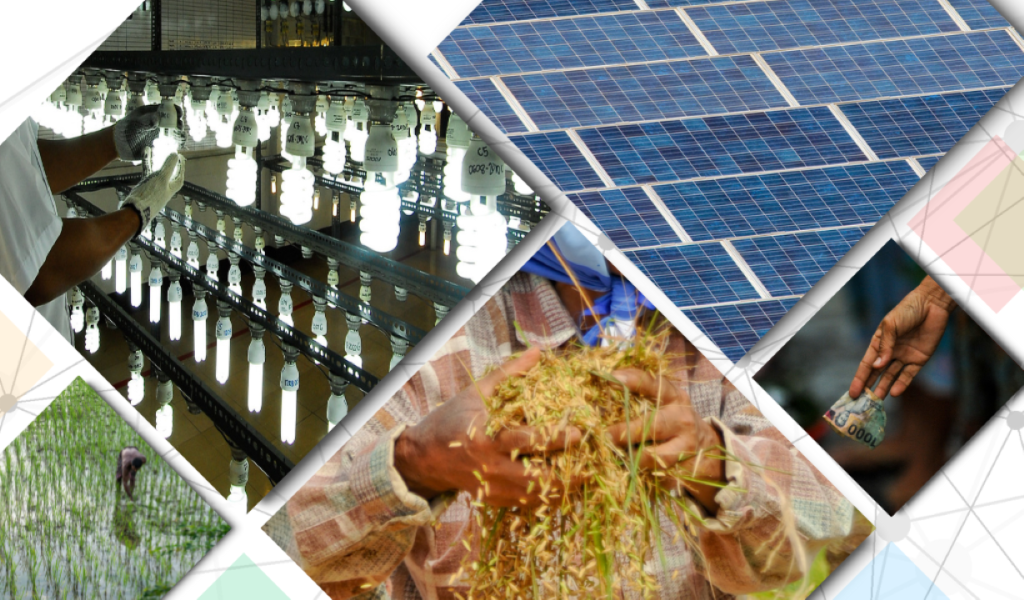Powering SDG Progress: Innovative Solutions at the Nexus of Energy, Food and Finance
Making a significant dent in the SDG targets by 2030 in the Asia-Pacific region will require interventions from multiple stakeholders, beyond the efforts made by the public sector, especially in the era of polycrisis, where the COVID-19 pandemic, climate crisis and Russian invasion of Ukraine are creating immense challenges on the fronts of the food, energy and finance sectors. Strong engagement with the private sector to solve these issues is imperative, especially for pioneering innovation which takes into account the nexus of the energy, food and finance systems.
The 2023 Asia-Pacific SDG Partnership Report by ESCAP, ADB and UNDP explores this nexus as an opportunity for accelerated progress and identifies initiatives across the region that are aiding in confronting these crises in the region to achieve the SDGs.
The Green Innovations for Tomorrow Corporation (GIFTC), Philippines
Huge amounts of rice husks are regularly disposed of in the Philippines through open fire which has serious health and environmental risks. The GIFTC established a biomass power plant which converts disposed rice husk as biomass into electricity for local households to solve the problem of agricultural waste in Talavera, Nueva Ecija province, the Philippines. GIFTC can turn 480,000 kilograms of rice husk biomass into electricity daily for nearly 6,480 households in selected municipalities and cities in Talavera, creating sustainable energy solutions for the local communities.
SOLShare, Bangladesh
Bangladesh is currently going through an energy crisis where many communities, especially in the rural region do not have regular access to traditional coal-produced electricity. SOLShare is working to solve this problem by creating a peer-to-peer electricity trading network for rural households in Bangladesh. It is currently operating in Shariatpur district of the country.
Households with or without solar panel are connected to each other through a low-voltage direct current mini-grid. Each household has a SOLShare electrical meter that allows it to buy or sell renewable electricity to neighboring households or businesses. This solution helps households and businesses without solar electricity gain access and enables households/businesses with solar panels to earn extra income through selling their excess electricity, with the use of a large mobile money payment infrastructure.
Agrosolar, Cambodia
Cambodia is highly dependent on its agriculture sector. However, a significant number of households use diesel water pumps for irrigation, which is not a sustainable source of energy. Agrosolar tries to solve this problem by developing, distributing, and financing affordable and sustainable solar-powered irrigation pumps for farmers. The company, through its innovative solution, endeavors to solve the challenges faced by farmers: water scarcity, low yields, low profitability, and financial exclusion. Agrosolar also plays a coordinating role along the supply chain, working with manufacturing and consumer financing companies.
Green Waqf Framework, Indonesia
Financing sustainable development solutions requires funding from various sources considering the large funding gap. Launched by the collaboration of Badan Wakaf Indonesia, a government agency, and UNDP in 2022 in Indonesia, the Green Waqf Framework is a promising Islamic Finance solution that helps address this funding gap. The framework defines Green Waqf as “the utilization of a waqf asset to support the attainment of ecological balance and sustainability, while also providing a social and economic impact for society”. The green financing option seeks to advance funding to SDGs, especially on Goal 7 (affordable and clean energy) and Goal 13 (climate action).
ATEC’s “eCook” stove, Bangladesh
In Bangladesh, two-thirds of households use biomass for cooking, creating health issues and pollution for its residents and the environment. ATEC has developed an electromagnetic induction stove – the ‘eCook’ stove – that provides clean and affordable cooking. The eCook stoves use a pay-as-you-go model, making them accessible and affordable to most households in the country. GSMA, a global technology company, and ATEC are also developing a mobile app that will be integrated into the cook stoves for the user to be able to track electricity usage, payment status and any carbon offset data, effectively increasing the overall affordability and usability of the stove.
These are some among many other promising initiatives and solutions which have the potential to be scaled up and replicated in other parts of the Asia and the Pacific region to maximize impact. More solutions at the nexus of energy, food and finance can be found within the SDG Solutions Map interactive feature of the Asia Pacific SDG Partnership website.

